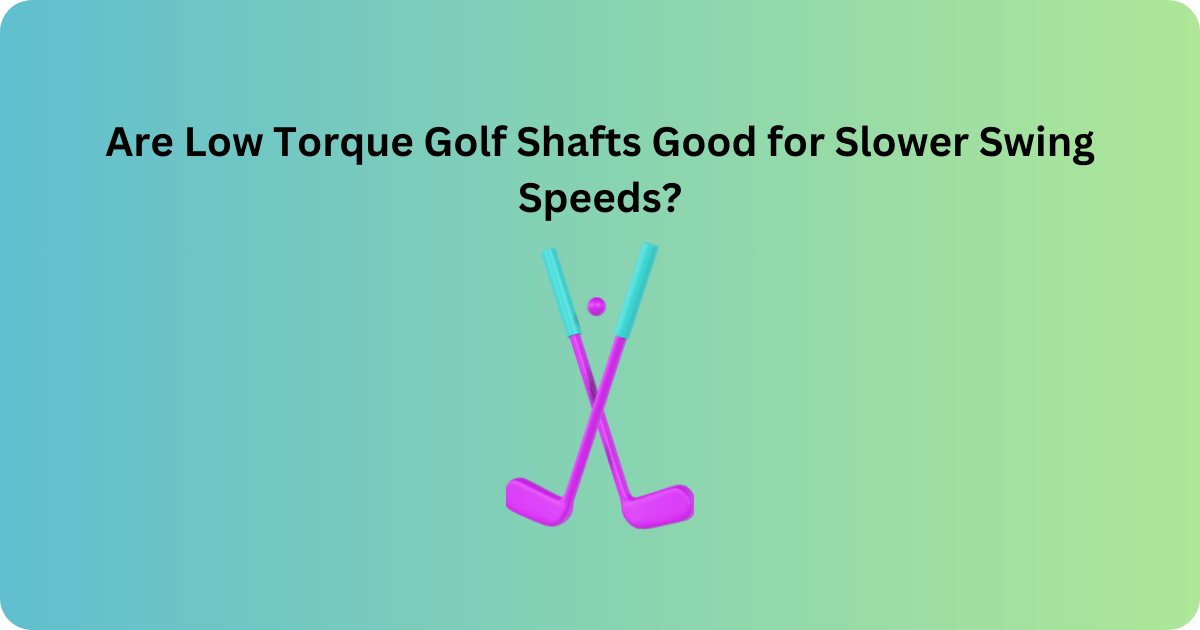Are Low Torque Golf Shafts Good for Slower Swing Speeds? For many golfers, choosing the right equipment is essential to improving their game. One crucial factor to consider is the torque of the golf shaft. This article will explain golf shaft torque, how it affects performance, and whether low-torque shafts suit players with slower swing speeds.
What is a Golf Shaft Torque?
In golf, Torque refers to how much the shaft twists during a swing. It is measured in degrees, and different shafts will have different torque ratings. When you swing the club, the force of your swing can cause the shaft to twist.
Here’s a brief overview of how torque works:
- Low Torque: A low torque rating means the shaft is less likely to twist. It can provide more stability and control, which is particularly useful for players with faster swing speeds.
- High Torque: A high torque rating allows for more twisting. It can create a softer feel and benefit slower swing speeds, allowing the clubface to close more easily at impact.
How Does Torque Influence Your Golf Game?
Understanding how torque affects your game is crucial when selecting the right shaft. Here are some key aspects of how torque can impact performance:
1. Control and Accuracy
Players often prioritize accuracy in their shots. A shaft with low torque offers increased resistance to twisting, which can help maintain the clubface’s angle at impact.
This stability can lead to straighter shots and reduced dispersion, meaning your shots will be closer to your target.
2. Feel and Feedback
The feel of a golf club is subjective, but it plays a significant role in a player’s confidence and Comfort. Low-torque shafts feel stiffer, providing a more direct connection and feedback during the swing.
Conversely, high-torque shafts may feel softer and more forgiving, which can help players with slower swings feel more in control.
3. Impact on Ball Flight
A shaft’s torque rating can also influence your shots’ trajectory. Low torque shafts often produce a lower ball flight, which can be advantageous in windy conditions.
On the other hand, high torque shafts may help players achieve a higher launch angle, which can benefit those who struggle to get the ball airborne.
4. Hook and Slice Mitigation
For right-handed golfers, low torque shafts can help reduce the tendency to hook the ball (hit it too far to the left). Since they resist twisting, these shafts can keep the clubface more square at impact, leading to straighter shots.
Conversely, players who tend to slice (hit the ball too far to the right) may find that high torque shafts provide the necessary flexibility to help correct this tendency.
Are Low Torque Golf Shafts Good for Slower Swing Speeds?
It brings us to the main question: Are low-torque golf shafts suitable for players with slower swing speeds? Experts agree that low torque shafts are typically not the best choice for golfers with slower swings (usually under 90 mph). Here are the reasons why:
- Power Generation
Golfers with slower swing speeds may struggle to generate enough clubhead speed to benefit from the stability of low-torque shafts. Instead, higher-torque shafts can help produce more power, allowing the clubface to close properly at impact, which can lead to better distance and performance.
- Forgiveness and Playability
Higher torque shafts tend to be more forgiving, meaning they can help players achieve better results even when their swing isn’t perfect. For slower swing speeds, a more flexible shaft can assist in squaring the clubface at impact, improving accuracy and distance.
- Comfort and Feel
Many golfers with slower swing speeds prefer the softer feel of higher torque shafts. This Comfort can translate into more confidence during their swings, which is crucial for improving performance on the course.
- Improved Launch Conditions
Players who have difficulty getting the ball into the air may find that higher torque shafts support a higher launch angle. It can be especially beneficial for players who need help generating lift.
Who Should Consider Low Torque Shafts?
While low torque shafts are generally better suited for faster swing speeds, they can still be advantageous for specific player types, such as:
- High Swing Speed Players: Golfers who swing faster (over 100 mph) can benefit from low-torque shafts’ stability and control. However, these players often require more precision to effectively handle their increased swing speeds.
- Players Seeking Control: Low torque shafts may help you keep your shots straighter and more consistent if you struggle with shot dispersion and prioritize accuracy.
- Golfers Who Tend to Hook: Low torque shafts can benefit those who frequently hook the ball, as the reduced twisting can help maintain the clubface angle.
Recent Advances in Golf Shaft Technology
The world of golf equipment is constantly evolving. Recent advancements in golf shaft technology allow manufacturers to create shafts that can be customized for individual players.
It means golfers can find shafts that balance weight, flex, and torque to suit their specific swing characteristics. As a result, players should consider getting fitted for their equipment to ensure they are using the best possible setup for their game.
Conclusion: Choosing the Right Shaft for Your Swing
Are Low Torque Golf Shafts Good for Slower Swing Speeds? While low-torque golf shafts offer benefits such as increased control and accuracy, they may not be ideal for golfers with slower swing speeds. Instead, players with slower swings should consider higher torque shafts that provide flexibility and forgiveness, better supporting their performance.
Finding the right golf shaft is crucial for optimizing your game. It’s always a good idea to consult with a professional for a fitting to determine the best equipment tailored to your swing.
Remember, the ultimate goal is to enjoy the game, and having the right gear can make a significant difference in your overall experience!
FAQs
What is shaft torque in golf?
Shaft torque is the amount of twisting a golf shaft experiences during a swing, measured in degrees. Lower torque indicates less twisting.
How does torque affect golf performance?
Torque affects control, accuracy, and feel. Lower torque shafts provide stability for faster swings, while higher torque shafts offer flexibility for slower swings.
Should beginners use low-torque shafts?
Higher torque shafts may benefit beginners more, as they provide more forgiveness and help square the clubface at impact.
Can high torque shafts benefit faster swing speeds?
Yes, high-torque shafts can help achieve faster swing speeds by providing a softer feel, which may enhance comfort and improve shot dispersion.
How do I know if I need a low or high-torque shaft?
Choosing the right shaft depends on your swing speed, style, and preferences. A fitting session with a professional can help you determine the best option.

James Smith is the author of a website called Golf Mentally. He believes that golf is as much about thinking as it is about swinging the club.
Golf Mentally helps golfers of all levels. It teaches new golfers the basics, like how to hold the club and hit the ball. It also helps more experienced golfers learn new things and improve their game.
James wants to help golfers think smart on the course, not just hit the ball hard. He believes that by thinking about your shots and staying positive, you can play much better golf.

